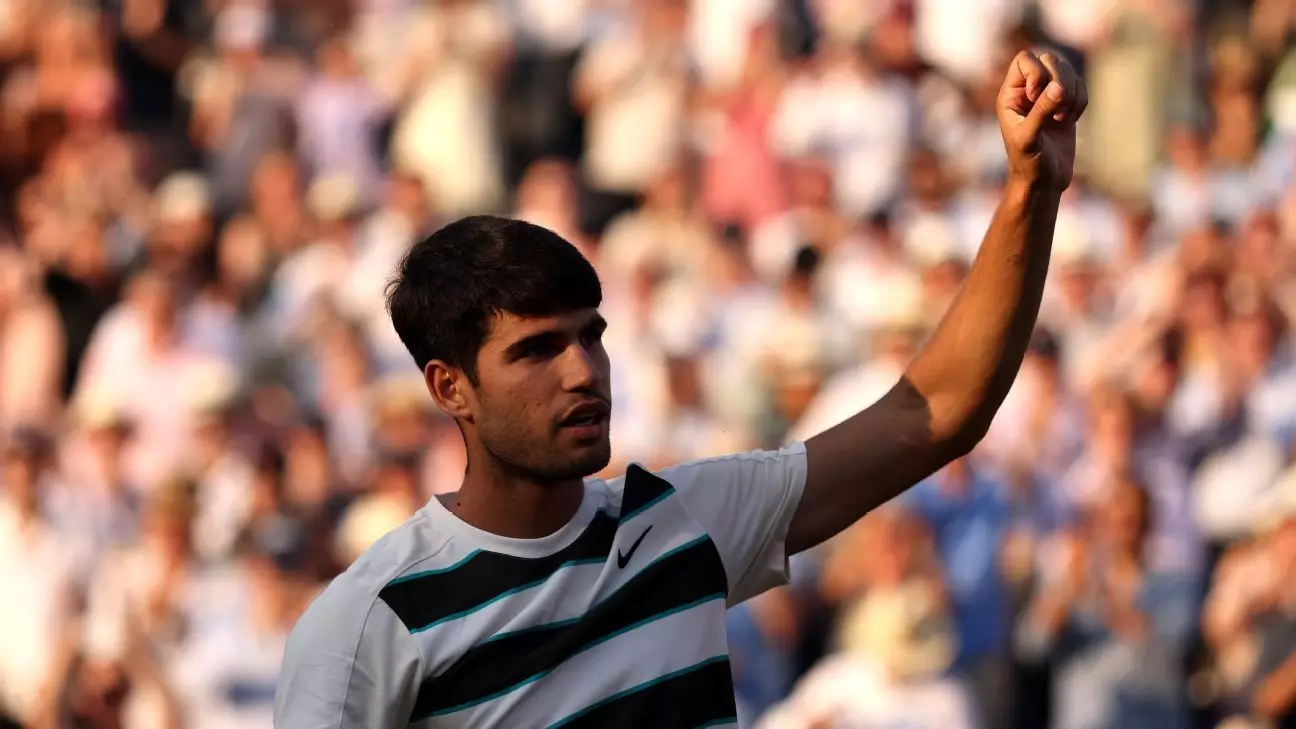The Wimbledon grass courts are a unique challenge for any player, but for Carlos Alcaraz, they seem to ignite an even deeper fire within. In a dazzling second-round match at the Queen’s Club Championships, the top-seeded Spaniard encountered a formidable opponent in fellow countryman Jaume Munar. This contest, a gripping display of athleticism and mental strength, pushed Alcaraz to the edge, leaving him tested yet victorious with a final score of 6-4, 6-7(7), 7-5. Despite the intense competition, Alcaraz’s prevailing spirit showcased why he currently stands as the world number two.
Resilient Resolve Amidst Adversity
From the outset, Alcaraz demonstrated his intent to dominate, easily capturing the first set. However, Munar proved to be no pushover; he fought back fiercely, managing to break Alcaraz’s serve multiple times and ultimately forcing a tense tiebreak in the second set. It was evident that Alcaraz, having recently triumphed in a grueling French Open final against Jannik Sinner, faced a different type of challenge altogether with Munar. The match, extending over three hours, revealed Alcaraz’s vulnerabilities while showcasing his resolve. The tension was palpable as he found himself a break down in the deciding set—a situation that could easily have unraveled a less tenacious competitor.
The Mental Game: More Than Just Tennis
Mental fortitude in tennis cannot be overstated. Alcaraz’s admission of struggling both mentally and physically during the match brings to light the psychological battles that often play out on the court. “I still don’t know how I’m standing here,” he confided, highlighting the grit that defines his character. In light of the match’s difficulty, his ability to conquer this mental hurdle as much as the physical one enhances his profile as a future champion. It’s one thing to be technically gifted, but to endure under immense pressure is what transforms a good player into a great one.
Next on the Horizon: More Challenges Await
As Alcaraz looks ahead to the quarterfinals, he will face French player Arthur Rinderknech, another obstacle that promises to test his skills further. The historical context is in Alcaraz’s favor, having previously beaten Rinderknech in their last two encounters. However, as any athlete knows, past victories mean little in the heat of competition. Rinderknech, having earned his quarterfinal berth after defeating American Reilly Opelka, will be hungry for a chance to topple the reigning French Open champion.
Emerging Talent: A Bright Future in British Tennis
While Alcaraz’s performance certainly stole much of the spotlight, another standout emerged from the Queen’s Club: British up-and-comer Jacob Fearnley. His journey to the quarterfinals marked a significant milestone in his career as he overcame French qualifier Corentin Moutet with a scoreline of 6-3, 2-6, 6-2. Fearnley’s declaration of joy in reaching his first quarterfinal was not just about the victory but also about validating his approach to the game. By sticking to an aggressive strategy, he exemplified the importance of believing in one’s game plan, even when faced with setbacks.
The Never-Ending Battle for Greatness
In tennis, the pursuit of greatness is often accompanied by uphill battles and unexpected challenges. For players like Alcaraz, each match is not just about accumulating wins but also about honing one’s resilience and psychological strategy. The grass may appear effortless, but it often conceals the sweat and grit of those willing to master it. As Wimbledon approaches, both Alcaraz and Fearnley have demonstrated that their aspirations to thrive on such prestigious grounds are not merely dreams but attainable goals driven by determination and hard work.
As they both prepare for their upcoming encounters, spectators are left pondering—will Alcaraz continue his impressive winning streak? And can Fearnley carve out his place on the ATP Tour with his newfound momentum? The answers will come, but for now, the thrill of the game is in the air, offering a taste of unpredictable excitement.


Leave a Reply